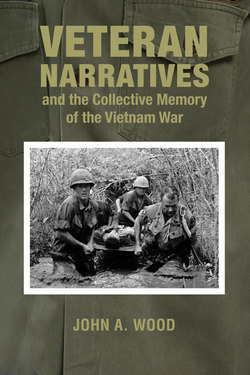Veteran Narratives and the Collective Memory of the Vietnam War

Реклама. ООО «ЛитРес», ИНН: 7719571260.
Оглавление
John A. Wood. Veteran Narratives and the Collective Memory of the Vietnam War
Отрывок из книги
Veteran Narratives and the Collective Memory of the Vietnam War
Series Editors: Ingo Trauschweizer and David J. Ulbrich
.....
Since West Point produced relatively few officers and participation in ROTC programs plunged as the war progressed, about 50 percent of all the junior army officers who served in Vietnam were OCS graduates.44 With so many non-college-educated men and women obtaining commissions through OCS or other means, it is likely that the Vietnam-era officer corps was composed of a substantial number of people from poor or working-class backgrounds.45 Several of the thirteen former officers without college degrees validate this assumption. Tobias Wolff was raised by a single mother, a secretary who worked nights as a waitress. When he joined the army in the mid-1960s, he was a teenage high school dropout. After basic training, however, Wolff went on to complete airborne school, Special Forces training, and finally, OCS.46 Another memoirist, Frederick Downs, grew up on a farm in Indiana and only completed a couple years of college before he enlisted in the army, but he also made it through OCS and became an officer.47
Although the great majority of authors were not from truly wealthy backgrounds, most nevertheless apparently came from the middle class. The disproportionately large number of memoirists with college degrees is one indication of this,48 but many veterans also provide other clues in descriptions of their pre-Vietnam lives. Authors regularly describe growing up in comfortable surroundings, often in the suburbs, and usually with at least one parent holding a secure, well-paying job. Joseph Callaway’s father worked in a “prestigious, major, advertising firm,”49 and Robert Mason’s father sold real estate for a living.50 Lynda Van Devanter describes her childhood as “middle-class suburban.”51 Even the relatively few memoirists who were raised in unambiguously working-class households sometimes describe their childhoods as stable and carefree. Ron Kovic, for instance, grew up in a working-class suburb, and his father worked in a supermarket. He nevertheless describes his prewar life as an idyllic world of baseball games, John Wayne movies, and parades.52 The prewar lives of low-income men who ended up in Vietnam, however, were not usually so untroubled.53 They were instead “full of very adult concerns: money, jobs, and survival.”54
.....